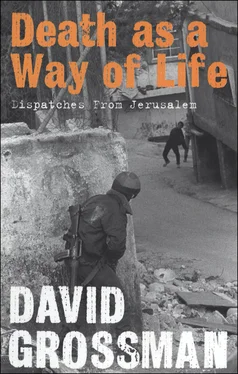David Grossman - Death as a Way of Life
Здесь есть возможность читать онлайн «David Grossman - Death as a Way of Life» весь текст электронной книги совершенно бесплатно (целиком полную версию без сокращений). В некоторых случаях можно слушать аудио, скачать через торрент в формате fb2 и присутствует краткое содержание. Год выпуска: 2013, Издательство: Bloomsbury Publishing, Жанр: Прочая документальная литература, на английском языке. Описание произведения, (предисловие) а так же отзывы посетителей доступны на портале библиотеки ЛибКат.
- Название:Death as a Way of Life
- Автор:
- Издательство:Bloomsbury Publishing
- Жанр:
- Год:2013
- ISBN:нет данных
- Рейтинг книги:5 / 5. Голосов: 1
-
Избранное:Добавить в избранное
- Отзывы:
-
Ваша оценка:
- 100
- 1
- 2
- 3
- 4
- 5
Death as a Way of Life: краткое содержание, описание и аннотация
Предлагаем к чтению аннотацию, описание, краткое содержание или предисловие (зависит от того, что написал сам автор книги «Death as a Way of Life»). Если вы не нашли необходимую информацию о книге — напишите в комментариях, мы постараемся отыскать её.
Death as a Way of Life — читать онлайн бесплатно полную книгу (весь текст) целиком
Ниже представлен текст книги, разбитый по страницам. Система сохранения места последней прочитанной страницы, позволяет с удобством читать онлайн бесплатно книгу «Death as a Way of Life», без необходимости каждый раз заново искать на чём Вы остановились. Поставьте закладку, и сможете в любой момент перейти на страницу, на которой закончили чтение.
Интервал:
Закладка:
Instead of pursuing what Arafat likes to call “the peace of the brave,” both sides are busy keeping a bloody, you-killed-me-I’ll-kill-you balance sheet. The principal objective is to avenge yesterday’s murder while minimizing the enemy’s retaliation tomorrow. Without noticing it, Palestinians and Israelis are reverting to the pattern of an ancient tribal vendetta, eye for eye and tooth for tooth.
It makes one suspect that the two peoples prefer to preoccupy themselves with this cruel ritual rather than really solve the problem at its roots. On second thought, it’s easy to understand (especially for anyone who lives here). “They give birth astride of a grave,” Samuel Beckett wrote in Waiting for Godot, and in the Middle East this description is terribly concrete: all of us, Israelis and Palestinians, were born into this conflict, and our identity is formulated, to no small extent, in terms of hostility and fear, survival and death. Sometimes it seems as if Israelis and Palestinians have no clear identities without the conflict, without the “enemy,” whose existence is necessary, perhaps critical, to their sense of self and community.
You become queasy these days listening to that unique form of self-directed Schadenfreude that fills Israeli and Palestinian leaders when their angry prophecies come true, in particular as a result of their own failings. They especially like to watch hope collapsing before their eyes. No less shocking is the enthusiasm with which so many Israelis and Palestinians adopt these despairing visions. When it comes down to it, so it seems, people get used to the injustices history has inflicted upon them, to the point that they forget what they are allowed to yearn for.
Sharon and Arafat are both cynical leaders. Their consciousnesses were shaped in war and violence, and their actions mirror each other like a carefully choreographed ceremonial dance. In order to achieve a compromise, both will have to renounce most of the fundamental concepts that have molded their worldviews and that have given them their standing among their peoples. Their actions in recent months make one suspect that they are deliberately making negotiations conditional on demands that have no chance of being met today. They direct government and society, including the media (which in the Palestinian Authority is mobilized to achieve the regime’s goals, and is also significantly mobilized in Israel as well), in order to divert the citizenry’s attention from the main issues and to create hostility toward the people of the other side.
As things look now, only a miracle or catastrophe will change the situation. If you don’t believe in the first and fear the latter, you realize that the only practical hope for saving Israel and the Palestinians from mutual slaughter is heavy international pressure on both of them. I still believe that Israel has the obligation to make the larger concessions in negotiations, because it is stronger, and because it is the occupier. But both sides must immediately end their uncompromising rhetoric and reduce their violent actions to the bare minimum, in order to resume negotiations. Another, more minute hope is for the willingness of individuals, Israelis and Palestinians, to renew open dialogue among them. This is not easy to do, but if such contacts take place, they will be of huge and not merely symbolic importance. They will remind both nations of what they must long for. They will create the only alternative to hatred and despair.
International Intervention, Please
June 2001
On June 1, 2001, after a particularly bloody period of constant terrorist attacks on Israelis inside Israel and in the West Bank and Gaza, a suicide bomber detonated himself in the middle of a large crowd of young Israelis outside a discotheque on the Tel Aviv beach. Most of the victims were Russian emigrants, many of them teenage girls. Under immense international pressure and a cry for restraint on both sides, Arafat publicly condemned the attack and promised to control his militias. The Israeli government threatened that if there were not an immediate end to terror, harsher military measures would be taken against the Palestinians.
Twenty-one boys and girls were murdered yesterday in a suicide attack committed by a Palestinian at a discotheque in Tel Aviv. Dozens more were seriously injured. Boys and girls of fourteen or slightly older. Two of them were sisters. None of them was a soldier. They bore no arms. They were children who had come to a birthday party.
This time the bomb was especially evil — besides the explosives, it contained hundreds of heavy ball bearings. Their effect on a human body is terrifying. Yesterday, when the attack was reported in the media, Palestinians went out into the streets of their cities and fired their rifles in the air to celebrate. Even in terms of the cruel dosages of violence that we have become accustomed to in recent years, this attack crossed a boundary. The international community seems to be beginning to comprehend the depth of the hatred and despair among both peoples, and their inability to free themselves from the trap they have so foolishly entered.
It seems to me that it is difficult today to argue against Israel’s right to defend itself by retaliating against the Palestinian Authority. There is no government in the world that would hold itself back after the incessant cruel and deadly attacks in the last ten days. And yet, with all due understanding of the anger and urge for revenge that have seized the Israeli people, we need to say: Force will not resolve the severe crisis between Israel and the Palestinian Authority.
The two sides have been drawing each other’s blood for almost a hundred years. Tens of thousands have already lost their lives. Yet the Arabs have not succeeded in destroying Israel, and Israel has not succeeded in cementing its occupation by force. These truths apply today as well, perhaps even more pointedly than before: perhaps the conflict between Israel and the Palestinians will have no political solution, either, without intense pressure from the international community. The two sides simply are not able today to return to a psychological state in which they can begin a movement toward compromise and conciliation. The darkest days of the Jewish-Arab conflict have not seen such polarized positions, so saturated with hatred and suspicion, as we see today.
It may well be that Arafat has lost control of his people. That is a frightening possibility, and recent events require us to discuss it seriously. I’d submit that even if it is true, no one ought to be too pleased about it, definitely not the Israelis. A crumbling Palestinian Authority, fired up because of what it sees as the “achievements” of terror — especially a Palestinian Authority that has surrendered to Hamas and Islamic Jihad — may bring a horrible catastrophe on itself, on Israel, and on the entire region.
Still, it may well be that Arafat did not order his men to prevent the recent terrorist attacks because he knew he would not be obeyed. If this hypothesis is true, it means that his declaration of a cease-fire this morning has no validity — just like dozens of his similar announcements in the past.
Arafat is now paying the price of flirting with terror. In recent years he has, time after time, released from his prisons Hamas terrorists who have committed attacks against Israel. He has done so to pressure Israel. For years he has been riding on the tiger’s back — that’s the local cliché—and now the tiger has thrown him off and confronts him.
Of course, Israel cannot be absolved of responsibility for Arafat’s weakened position. For years Israel has done everything — even during the negotiations after the Oslo Accords — to strengthen its grip on the occupied territories. The Palestinians watched as Arafat was forced to make ever-greater concessions, while the Israeli settlements grew before their eyes and many Israeli roads were paved through the territory promised to the Palestinians. It is clear that this has strengthened the position of the extremists, at the expense of Arafat and of peace.
Читать дальшеИнтервал:
Закладка:
Похожие книги на «Death as a Way of Life»
Представляем Вашему вниманию похожие книги на «Death as a Way of Life» списком для выбора. Мы отобрали схожую по названию и смыслу литературу в надежде предоставить читателям больше вариантов отыскать новые, интересные, ещё непрочитанные произведения.
Обсуждение, отзывы о книге «Death as a Way of Life» и просто собственные мнения читателей. Оставьте ваши комментарии, напишите, что Вы думаете о произведении, его смысле или главных героях. Укажите что конкретно понравилось, а что нет, и почему Вы так считаете.












